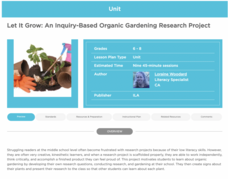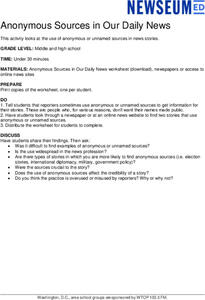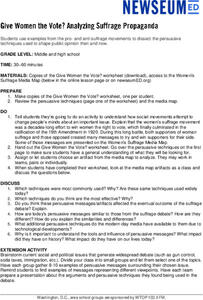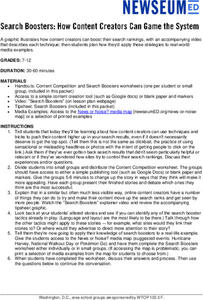Overcoming Obstacles
Learning How You Learn Best
Scholars think of a special place, then represent that place through pictures or written words— a poem, song, or short story. Peers show off their organizational skills by reviewing their binders and notebooks, comparing strategies, and...
Overcoming Obstacles
Taking Tests
In a lesson designed to prepare scholars for taking tests, they begin with a review of how to plan and review notes. They Identify ways to prepare for upcoming tests and strategies for studying and memorizing information. Class members...
Overcoming Obstacles
Writing Reports
Following a review of how to research and take notes, scholars define the term paraphrase and identify ways to organize information and finish reports. To put their newfound knowledge to the test, learners interview a peer, take notes,...
Overcoming Obstacles
Taking Notes
A instructional activity on taking notes challenges scholars to listen and write important information they can use later. Pupils begin with practice notes, write new notes with guidance, then test their note-taking skills independently....
Overcoming Obstacles
Using Appropriate Resources
A lesson dives deep into reference materials. The class begins with a discussion of which resources are best used for specific purposes and how to identify ways to get the needed information. Learners share information about the internet...
Overcoming Obstacles
Following Instructions
A instructional activity about following directions tests learners' ability with a tricky scenario that will shock unsuspecting participants. After viewing results, scholars discuss why it's important to follow instructions and define...
Overcoming Obstacles
Getting Organized
A lesson plan challenges scholars to get organized. A thoughtful discussion sheds light on time management and the benefits of staying organized. Learners then reflect on their current time management skills, organize notebooks or...
Newseum
You Can’t Say That: Right to Know vs. Security Risk
Print or block? That is the question young journalists debate as part of their study of the freedom of the press. Half the class represents the journalists' legal team, and the other half represents the government's legal team. Teams...
University of Maine
Healthy Relationships
A three-part Healthy Living Curriculum begins with a look at how self-esteem impacts relationships. Individuals identify their own positive qualities and then consider how statements on social media may impact self-esteem.
Beyond Benign
The Story of Cosmetics Video Assessment
Does your shampoo contain carcinogens? Scholars learn how cosmetic companies create and market their products, many of which contain toxic chemicals. They examine the bias and consumer responsibilities in the industry.
ReadWriteThink
Persuasive Essay: Environmental Issues
Young environmentalists learn how to craft a persuasive essay about an environmental issue they consider important. After studying the components of a persuasive essay and examining a student model, writers brainstorm possible topics and...
ReadWriteThink
Let It Grow: An Inquiry-Based Organic Gardening Research Project
How does your garden grow? An inquiry-based, organic gardening unit asks young scientists to research a vegetable or flower, create an environment for it, and then plant and tend to the seedling. Gardeners develop their own research...
Facing History and Ourselves
Identity and Choices
Timshel! Thou mayest! is the big idea in a lesson that reminds learners that they have choices about how they present themselves to others. To begin, individuals rate the degree to which the choices they make each morning are influenced...
Newseum
Quick Skim or Deep Dive? Picking the Right Search Strategy
To search online to find answers to some questions requires only a quick skim, while others demand deep research. Scholars engage in a lesson that teaches them the difference and how to craft questions that produce the best online search...
K20 LEARN
Identity Theft: Don't Let This Happen to Your Grandma!
Class members consider how people steal online identities as they discover the essential elements of identity theft and consumer fraud. Pupils demonstrate learning by creating a poster or video about how to avoid identity theft.
Newseum
Is It Fair?
Young journalists learn how to analyze word choice, context, and counterpoints to judge the fairness of a news story. They practice using these tools to judge a series of headlines for the story of Goldilocks and the Three Bears. They...
Anti-Defamation League
Is Olympic Coverage Sexist?
Women Olympians have come a long way since 1900 when 22 women competed for the first time. News coverage of the Olympics has also changed dramatically. What has been slow to change, however, is the language used in the coverage of female...
Newseum
Civil War: Encoding the News
Young journalists learn to appreciate the advantages of how modern media technology enables rapid news delivery as they compare today's media revolution to how the telegraph and Morse Code revolutionized news coverage during the Civil...
Newseum
Bias Through History: Analyzing Historical Sources
Young journalists use the E.S.C.A.P.E. (evidence, source, context, audience, purpose, and execution) strategy to evaluate historical and contemporary examples of bias in the news. The class then uses the provided discussion questions to...
Newseum
The Press and the Presidency: Friend or Foe? How the President Is Portrayed
In theory, news reports should be fair and unbiased. Young journalists test this theory by selecting a current news story covered by various media outlets about the President of the United States. They then locate and analyze five...
Newseum
Anonymous Sources in Our Daily News
Young journalists search for two examples of news stories, either published or online, that use anonymous or unnamed sources. They then consider the possible motives for why the sources remain unidentified, the types of stories that use...
Newseum
Give Women the Vote? Analyzing Suffrage Propaganda
Propaganda is often used to shape public opinion. Scholars investigate the persuasive techniques used by the pro- and anti-suffrage movements. Groups compare how these devices were used during the suffrage movement with how the same...
Newseum
Search Boosters: How Content Creators Can Game the System
Scholars examine the techniques content creators use to boost their search rankings. After watching a short "Search Boosters" video, groups select a story from the "News or Noise? Media Map" and analyze the devices used in the story. The...
Franklin D. Roosevelt Presidential Library & Museum
The Power of Propaganda in Shaping Civic Actions and Understanding
Propaganda posters are powerful. Using images from The Art of War: American Poster Art 1941-1945 exhibit, young historians analyze the symbols, images, colors, and text used to rally support for World War II. Through seven activities,...

























